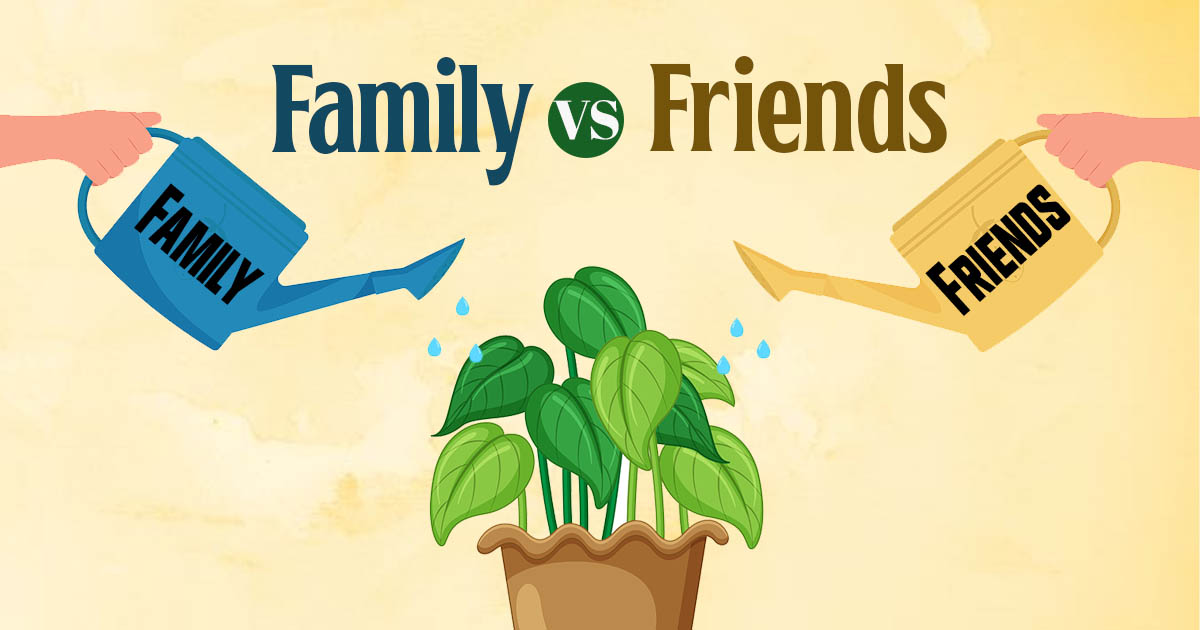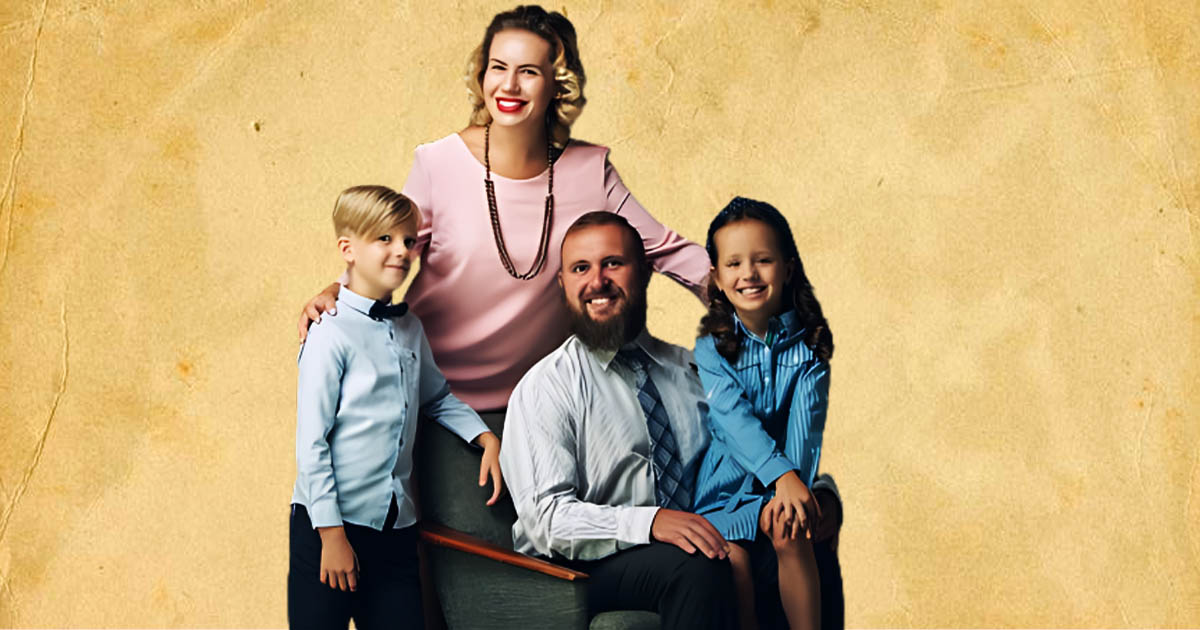Is it better to have friends or family? It’s a dilemma rooted in the intricacies of human connections, societal expectations, and individual preferences.
Family, tied by blood and shared experiences, often feels like an unbreakable support system. They offer love, belonging, and a sense of who we are. Friends, on the other hand, bring a different kind of closeness. They’re the pals we choose, sharing interests and supporting us emotionally.
This article explores the upsides and downsides of family vs friends, helping you navigate the complexities of these relationships. We’ll discuss emotional support, shared values, trust, and how cultural ideas shape our views.
Family Vs Friends: Why This Conundrum?
The conundrum between family vs friends often arises due to the complexities of human relationships, societal expectations, and individual priorities.

Family bonds are often considered deeper and more permanent due to blood relations and shared experiences over time. However, friendships can also develop strong emotional connections, sometimes rivaling those of family.
Both family and friends can serve as support networks, but they often offer different types of support. Family may provide unconditional support, while friends may offer more specialized or situational support based on shared interests or experiences.
Cultural norms and societal expectations can play a significant role in shaping attitudes toward family vs friends. In some cultures, family ties are highly valued and prioritized above all else, while in others, friendships hold equal or even greater importance.
Read More: How to Help Your Child Make Friends: 10 Effective Tips For Parents!
Better To Have Friends Or Family: 10 Things To Consider
Deciding whether it’s better to prioritize friends or family depends on various factors, and it’s ultimately a highly personal decision.

Here are some considerations to help you navigate this choice of whether it is better to have friends or family:
1. Emotional Support:
Families are known for their emotional support; they’ve seen you at your lowest and highest points–you don’t have to remind them what they’re like. Having a good family is like having a built-in therapist, there’s no substitute.
But friends can sometimes offer insights that your family just doesn’t have the expertise to help with. Friends provide an outside perspective of things, they can be objective in ways that families can’t.
It’s important to have both friends and family for emotional support so as to cover as many bases as possible.
2. Shared Values and Interests:
There’s nothing better than spending time with someone who has the same values and interests as you do — it’s almost euphoric. This could be found within either friends or family members.
Family members tend to share cultural, religious or familial values with you – which helps create a strong bond between everyone involved.
In contrast, your friends probably relate more closely with you on things like hobbies, career goals or personal philosophies — these kind of bonds also creates a sense of belonging.
3. Trust and Reliability:
Trust — one word but it means so much. It’s hard to come by but once it’s built into any relationship (family or friendship), it provides security and dependability which is invaluable.
Friends prove themselves reliable when they show up for you when needed most — waiting hours for a reply from your mom just isn’t always practical unfortunately.
On the other hand, close friends are often trustworthy enough to offer unwavering support during troubling times without question because they’ve earned that trust through consistent reliability over time.
4. Quality of Relationships:
Not all relationships were created equal — some are garbage while others transcend time itself. The strongest couple on this earth is made up of communication, respect, care: three words that are simple on their own but together change everything
A healthy relationship should promote open communication and create a space for individuals to feel comfortable expressing themselves without fear of judgment or reprisal.
Mutual respect is also an important factor. It shows that both parties recognize each other’s worth, boundaries, and autonomy.
Genuine care involves demonstrating empathy, compassion, and support for one another’s well-being. It encompasses acts of kindness, empathy, and emotional support that ultimately show how much two people truly care about each other’s happiness.
5. Boundaries and Autonomy:
Not everyone respects boundaries — you know this. But setting them (and making sure they’re respected) is vital in maintaining healthy relationships with family or friends. There isn’t much wiggle room when it comes to familial relationships since many expectations are predetermined from birth
However with friends you have more flexibility to determine the terms of your relationship on your own terms.
Setting clear boundaries ensures that your needs and priorities are respected — no compromises here.
6. Lifestyle and Life Stage:
Family versus friends can be determined by simply looking at your current lifestyle or life stage – but it’s never simple!
During times of transition such as moving to a new city or preparing for a baby, familial support is irreplaceable in stability and guidance.
But when you’re personally exploring or climbing up the career ladder then those close friendships should come out of the shadows because they’ll be the ones who understand what you’re going through the most!
Being able to adapt to life’s changes, whether it be in your family vs social circle, means being open to new experiences.
Read More: 10 Effective Ways to Develop Emotional Intelligence in Children
7. Geographical Proximity:
The geographical proximity of your family and friends can impact the frequency and depth of your interactions with them.

Living in close proximity to family members may facilitate regular gatherings and shared activities, fostering a strong sense of community and support.
On the other hand, maintaining connections with friends who live far away may require more intentional efforts, such as scheduling regular calls or planning visits.
Leveraging technology and prioritizing quality time together can help bridge the distance and strengthen bonds with both family vs friends.
8. Support Networks:
Support networks are important for our resilience and well-being, and by building a diverse web of relationships with family and friends, we can ensure we have built ourselves a strong support system.
When contemplating whether it is better to have friends or family, it becomes clear that each type of relationship offers its own unique perspective, experiences, and forms of support which all contribute to our emotional health.
Family relationships often act as a foundation of love and support that comes as second nature. This life-long connection is rooted in the understanding of shared history, deep bonds, and tradition which creates an unbreakable safety net for those difficult times in life.
Because they too were raised within this same bloodline, family members are able to provide comfort during times when you need them most. Their unwavering loyalty serves as an anchor to keep us grounded in who we are as people.
In contrast, friendships offer a different type of support that is more focused on empathy and companionship. They create a space for us to safely share our joys and sorrows while providing an ear to listen on bad days or reassurance when we need it most.
Their perspectives on life may differ from ours which is why they enrich our lives with diversity. Through their interests you will be introduced to things you never would’ve stumbled upon on your own. These similarities spark a sense of camaraderie that gives us purpose outside of work or school.
9. Cultural And Societal Influences:
Cultural norms play an enormous role in shaping attitudes towards family vs friendship throughout the world. Some regions value family ties above anything else while others find that friendships allow freedom in choosing who they surround themselves with socially.
10. Personal Growth:
Personal growth is directly influenced by the people we spend time with including both those connected by blood vs chosen family (friends). Each relationship type offers distinct opportunities for personal growth which help shape who we become throughout our self-discovery and evolution.
Family members, especially parents, siblings, and older relatives, often serve as mentors and role models. They’re able to teach us from personal experiences that they’ve encountered throughout their lives which we would otherwise have no way of knowing ourselves.
Through their love we feel safe to explore our talents and interests. This reassurance helps in building a strong sense of identity while also reminding us that there is a community out there who supports us through thick and thin.
Choosing whether or not you’d like to prioritize relationships with family over friends will always come down to personal preference. Values and life experience can alter everyone’s outlook on this topic so it’s important to stay true to ourselves when making these kinds of decisions.
Read More: 10 Subtle Signs Your Family Hates You And How To Deal With Them!
A Word From Mind Family
We totally understand how important it is to build and nurture relationships with family vs friends so that you can grow into the best version of yourself, and have a life worth living.
There’s nothing quite like the feeling of belonging that comes from a family bond rooted in unconditional love. On top of that, they’re also great for helping us learn about our values and identity as we navigate through life’s many obstacles.
All this would be impossible without good friendships though. Having people around you who are always there to encourage you, keep you company, and offer new perspectives is super valuable when trying to expand your horizons.
So take the time to get close with those people in your life who truly matter. Trust me when I say: It’ll help them just as much as it helps you.
Frequently Asked Questions (FAQs)
1. Why is family important?
Family is vital for providing love, support, and a sense of belonging, shaping our identity and values through shared experiences.
2. What do friends offer?
Friends offer companionship, understanding, and emotional support, enriching our lives with shared experiences and perspectives.
3. How do cultural norms affect relationships?
Cultural norms influence perceptions and expectations, shaping attitudes towards family and friends and defining the dynamics of relationships.











